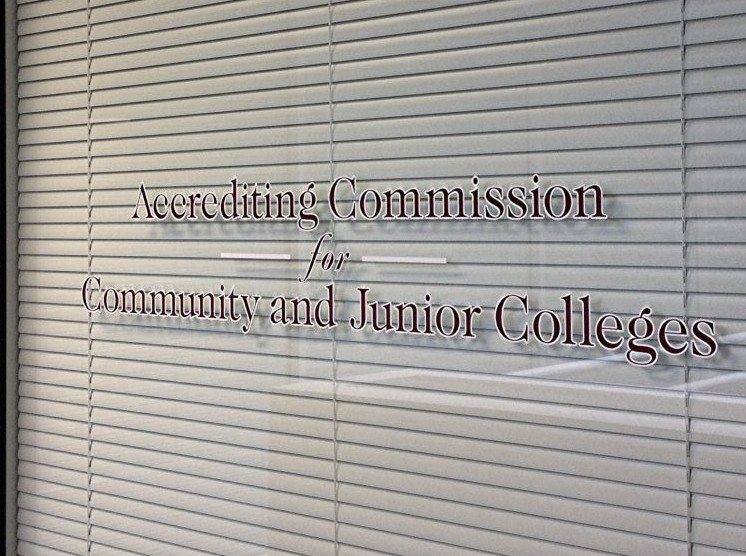Education
College Accrediting Commission Gets Reform Overhaul
The Accrediting Commission for Community and Junior Colleges had fought to close City College of San Francisco, only to find its own policies come under harsh public scrutiny.

Accrediting Commission for Community and Junior Colleges office in Novato. (Photo: Capital & Main Staff)
The California Federation of Teachers has settled its long-standing lawsuit against the commission that accredits community and junior colleges, ensuring that “fair accreditation practices will be the norm going forward,” a union official told Capital & Main.
“The agreement is a tremendous achievement for all California community colleges,” federation president Josh Pechthalt said.
Richard Winn, the new president of the Accrediting Commission for Community and Junior Colleges (ACCJC), agreed. “We are very pleased to arrive at a mutually satisfactory settlement,” Winn said. “We look forward to a collaborative relationship with the [union] going forward.”
The commission ignited a firestorm of controversy five years ago when it attempted to strip the City College of San Francisco of its accreditation. The CFT and the American Federation of Teachers Local 2121 sued, and the San Francisco city attorney won an injunction keeping the school open with its accreditation. When ACCJC sanctions result in a school losing accreditation, the school may close or, as in the case of Compton Community College, be absorbed by another district. Without accreditation, students are no longer eligible for federal and state financial aid programs, and their degrees become worthless. (Disclosure: CFT and AFT are financial supporters of this website.)
The agency had criticized the City College of San Francisco (CCSF) for having too few administrators but too many faculty, and for staff salaries it considered too high–salaries set through collective bargaining. The agreement, reached in August, formalizes a policy banning the commission from interfering in collective bargaining as it previously had done, said Tim Killikelly, president of the AFT local that represents CCSF faculty.
The agreement also ends the ACCJC’s use of student learning outcomes to evaluate faculty.
Under the agreement the ACCJC must “ensure at least three members of any evaluation team are currently employed as active duty faculty members.” The ACCJC had earlier favored increasing non-faculty members as faculty evaluators.
“This was a real sticking point for us,” Pechthalt said. The ACCJC’s Winn declined to comment on faculty evaluators or any other policies the agreement amends, deletes or formalizes.
The agreement bars conflicts of interest from the community college evaluations. Former ACCJC President Barbara Beno’s husband, Peter Crabtree, had been a commission evaluator of the CCSF.
The California Community Colleges Consultation Council, an 18-member panel reporting to the state’s Community College Chancellor, becomes a new reviewer of ACCJC accreditation policy proposals under the agreement. This provision aims to provide more transparency in the way the ACCJC develops policies, a move away from the nepotism that had allegedly been a past factor in naming evaluators. Another of the agreement’s main issues is how fairly the ACCJC financially evaluates California community colleges. The ACCJC must apply consistency “in the review of all institutions,” the settlement says.
The ACCJC admits in the agreement that it had practiced an inconsistent policy in its past financial evaluation of community colleges. For example, the agency had criticized CCSF for receiving a grant from the 2009 American Recovery and Reinvestment Act, while praising other community colleges for getting money from the same federal source, the AFT’s Killikelly said.
The agreement also lengthens the ACCJC’s reaffirmation of accreditation from 18 months to seven years. This policy change will provide community colleges with more time to address “remaining compliance issues” to maintain accreditation requirements that ensure vital government funding.
Finally, the agreement contains a dispute resolution process over the ACCJC’s performance as the sole accrediting agency for California’s community colleges. A jointly funded professional mediator will be available if the commission and the unions are unable to reach a resolution.
San Francisco City Attorney Dennis Herrera, who won the 2014 injunction that urged the commission to end its threat to close CCSF, said by email that he applauds the unions “for ensuring that there are fair accreditation practices for all community colleges in California. Like our success in San Francisco, their work has helped pave the way for a quality education for any Californian who wants it.”
Copyright Capital & Main

-

 The SlickJanuary 23, 2026
The SlickJanuary 23, 2026Yes, the Energy Transition Is Coming. But ‘Probably Not’ in Our Lifetime.
-

 The SlickJanuary 27, 2026
The SlickJanuary 27, 2026The One Big Beautiful Prediction: The Energy Transition Is Still Alive
-

 Column - State of InequalityJanuary 29, 2026
Column - State of InequalityJanuary 29, 2026Are California’s Billionaires Crying Wolf?
-

 Latest NewsFebruary 3, 2026
Latest NewsFebruary 3, 2026Amid the Violent Minnesota Raids, ICE Arrests Over 100 Refugees, Ships Many to Texas
-

 Dirty MoneyJanuary 30, 2026
Dirty MoneyJanuary 30, 2026Amid Climate Crisis, Insurers’ Increased Use of AI Raises Concern For Policyholders
-

 Featured VideoFebruary 4, 2026
Featured VideoFebruary 4, 2026Protesters Turn to Economic Disruption to Fight ICE
-

 The SlickFebruary 2, 2026
The SlickFebruary 2, 2026Colorado May Ask Big Oil to Leave Millions of Dollars in the Ground
-

 Column - State of InequalityFebruary 5, 2026
Column - State of InequalityFebruary 5, 2026Lawsuits Push Back on Trump’s Attack on Child Care

